Each semester, the Graduate School works with our academic colleges to find inspiring speakers for our Graduate Hooding Ceremony.

Jessica K. Barfield is receiving a PhD from the College of Communication and Information in Information Sciences. She gratefully thanks her advisor Professor Suzie Allard and the faculty in her program for their incredible encouragement and support during her four years at this institution.
Her journey to the University of Tennessee, Knoxville, began in Chapel Hill, North Carolina, her hometown, to Dartmouth College where she was a Division I scholar-athlete for four seasons. After Dartmouth, she attended graduate school at the University of Wisconsin-Madison where she earned an MS in marketing. In 2020, she returned to the South and enrolled in her PhD program here at UT.
Jessica’s research focuses on human interaction with social robots and has led to awards and honors at the national and international level. She is a Southeastern Conference Emerging Scholar, she received the Eugene Garfield Doctoral Dissertation Fellowship, she was awarded the College of Communication and Information Graduate Student Research Award, and she received the Reeder-Siler Fellowship. She was invited to attend the Association for Computing Machinery’s Human Information Interaction and Retrieval Doctoral Consortium and received the Association for Information Science and Technology scholar award in Social Informatics. Jessica has published over 10 refereed papers, three book chapters, and more than 20 presentations at national and international conferences.
Taking the Volunteer Spirit to heart, Jessica has been active in service and leadership to UT, the local community, and to professional societies. Jessica is the student representative for the Knoxville Campus Advisory Board for the Office of the Chancellor, she serves on the Executive Board as the Technology Officer for the Graduate Student Senate, and she is the student liaison for the Research Council of the Faculty Senate.
In terms of her research studies, designing robots that can meet the needs of diverse users has been a major goal and her research focuses on the (mis)treatment of social robots. She envisions a future with smarter robots that can help make our lives better in areas such as education, healthcare, and industry services. Jessica is excited to contribute to the field of human-robot interaction thanks to a great education and experience at UT.
Past Speakers
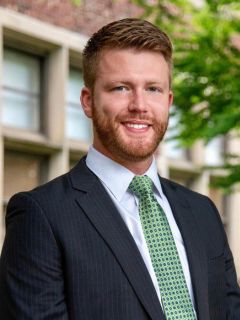
Hunter A. Hammock, a passionate plant scientist, has crafted a legacy of leadership, service, and scholarly excellence at the University of Tennessee, Knoxville. His journey, marked by a commitment to his research and improving society, has led him to significant achievements in both academic and leadership roles. This Tennessee native is proud to receive his PhD in plant, soil, and environmental sciences from the Herbert College of Agriculture.
Hunter cultivated a deep love for nature at a young age, cherishing memories of tending the garden alongside his grandparents. Starting his journey at UT in 2010, he delved into the field of chemistry. His dedication went far beyond academics, as demonstrated by over 240 hours of community service and completion of the Leadership Knoxville Scholars program. In 2012, he co-founded the UT Chapter of NSLS, a prominent student leadership and service organization. During his time as president, his ability to foster relationships and inspire teams played a pivotal role in the growth of this leadership organization, which now boasts over 5,300 active and alumni members.
Hunter’s research interest was sparked during his senior year when he joined the crop physiology lab headed by Carl Sams, a professor in the Department of Plant Sciences. He found a way to merge his analytical chemistry background with horticulture. After earning his BS degree in 2015, Hunter pursued a graduate research/teaching assistantship in which he studied the impact of LEDs on crop production. In 2018, he earned his MS in plant sciences and began his doctoral program, studying the influence of light on the primary and secondary metabolism of basil. Demonstrating expertise in his field, Hunter has published six peer-reviewed manuscripts and earned numerous recognitions at the regional and national levels. Notably, he secured first place while presenting his capstone dissertation project at the annual conference of the American Society for Horticultural Science, a premier society for horticultural professionals. He also held several graduate leadership roles, including president of the Graduate Student Senate and advisor for the UT Chapter of NSLS. His efforts culminated this spring by receiving the prestigious Chancellor’s Citation for Extraordinary Campus Leadership and Service.
Believing that sustainable production of flavorful and nutritious food is foundational to societal health and happiness, Hunter is driven to use his leadership and research acumen to address evolving challenges in horticulture, human nutrition, and sustainability. His research interests include plant/light interaction, flavor chemistry, phytonutrients, human health, vertical farming, LED lighting, and hydroponics.
Influenced by his grandparents’ involvement in agriculture, and the guidance of his collegiate mentors, Hunter aspires to leave a legacy reflecting his enriching experiences on Rocky Top. His passion for research, dedication to service, and desire to foster growth in others will undoubtedly continue to impact the field of plant science and beyond for years to come.
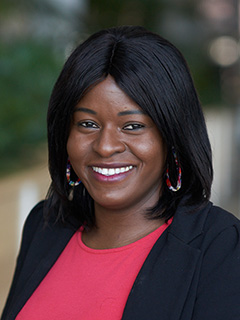
Amie Fornah Sankoh is proud to graduate with a PhD from the Department of Biochemistry & Cellular and Molecular Biology at the University of Tennessee, Knoxville. Amie’s journey into scientific research began at the Rochester Institute of Technology, where she earned degrees in laboratory sciences and biochemistry. She completed several internships and committed to continuing her scientific research by coming to UT in 2017 for her PhD. Amie has accomplished much during her time at UT. She won a National Institute of Health (NIH)-supported fellowship for her first two years in graduate school, a three-year Graduate Research Fellowship from the National Science Foundation, and another NIH predoctoral fellowship for the remainder of her time in graduate school. This track record of securing independent research support is remarkable for a graduate student. Additionally, she has completed four scientific publications, with more on the way, given a presentation at a national meeting in her field, and delivered multiple poster presentations.
Amie’s research interest is biological communication. Communication is fundamental to the survival of any individual or population of organisms. She studied the effects of hormones on plant-pathogen interactions. Her experiences bring a very different perspective to research that is unfortunately rare due to the limited opportunities available in STEM to young Deaf persons of color.
Amie’s life has been a story of perseverance. Growing up Deaf during the civil war in Sierra Leone, she had to overcome barriers to survival, education, and language acquisition. She carries these experiences with her, and instead of breaking her, they have helped her to thrive. Equally important to Amie are her outreach activities helping to bring education to other young Deaf and Hard of Hearing students. At the Tennessee School for the Deaf (TSD), she has served as a role model for Deaf students to help them and their parents see the possibilities of STEM careers. She continues to work to provide Deaf students the opportunity to gain hands-on laboratory experiences. Amie was also the TSD commencement speaker for the class of 2021. Undoubtedly, the most exciting moment of Amie’s journey has been the breakthrough realization that her identity rests firmly and joyfully on two premises: she can be a great scientist and an advocate for her community.
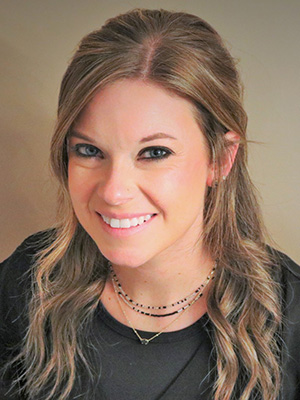
Growing up in Eads, Tennessee, Ashley Reeves was surrounded by animals, and they have always been a major part of her life. As far as she was concerned, there was never a Plan B: her future was going to be in veterinary medicine. She has taken many important steps along this path, including spending the summers of 2012 and 2013 in Africa as part of an internship program where she learned about caring for the many non-domestic cats, such as lions, tigers, leopards, servals, and caracals. Ashley began her professional studies as a veterinary student at UT in 2015 in the dual DVM-PhD program and received her DVM in 2019. In fall 2022, she will cross yet another major milestone in achieving Plan A, receiving her PhD in comparative and experimental medicine.
Ashley’s PhD research has laid the foundation for an effective model to support the ocelot population in Texas. Ocelots are a free-ranging wild feline species that are native to Central and South America and the southern United States. Habitat loss and fragmentation has had a devastating impact on ocelots and there are fewer than 100 individuals remaining in Texas. Ashley has investigated the use of assisted reproductive protocols to counter the loss of genetic diversity and health fitness in the ocelot population. This study, which is being conducted in collaboration with Texas A&M University-Kingsville and the Center for Conservation and Research of Endangered Wildlife (CREW), not only adds significantly to research on species conservation, but highlights UT at national and international levels.
She spoke eloquently about her subject when she participated in the UT Three Minute Thesis competition in 2021 and that same year in Kingsville, TX, she received first place People’s Choice and Special Director’s Award at the East Foundation’s Three Minute Thesis competition. After graduation, Ashley will take a position with the East Foundation in south Texas, where she will not only continue her work with ocelot recovery but also expand her efforts in conservation to other species.
Beyond her research at UT, Ashley actively mentors undergraduate research studies and veterinary student summer research experiences. When not engaged in research or serving as a role model for other students, she enjoys being outdoors. Among her favorite “outdoorsy” activities are playing soccer, training her border collies, riding horses, and spending time with family.
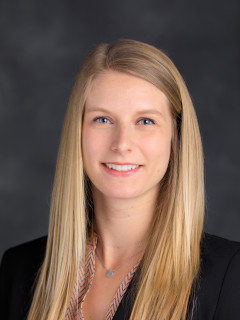
Devon Carroll is receiving her PhD in plant, soil, and environmental sciences with a concentration in weed science from the Herbert College of Agriculture. Devon’s decision to pursue education in the agricultural sciences was heavily influenced by her upbringing. She spent her childhood engaging in outdoor activities in a rural community near Scranton, PA, and is the fourth generation to reside on her family’s farmland. Devon’s connection to nature was strengthened playing on her high school golf team, leading her to major in turfgrass science at Penn State as an undergraduate.While at Penn State, Devon earned a BS in turfgrass science, completing her degree in just 2.5 years. She also received an MS in agronomy from Penn State before coming to the University of Tennessee, Knoxville. Studying turfgrass weed science under the supervision of her advisor, Jim Brosnan, Devon has achieved great success at UT. Her research findings have been communicated in ten peer-reviewed publications as first author and numerous trade journal articles, scientific abstracts, and speaking engagements.
Of all her research efforts, Devon is most proud of a study she conducted assessing how women have sustained their leadership roles in the turfgrass industry. This research aimed to promote change and encourage more women to pursue careers in turfgrass as women comprise only 3% of the turfgrass industry labor force. The project was part of the degree requirements for a MS in agricultural leadership, education, and communications, which Devon earned concurrently with her PhD.
Beyond scientific endeavors, Devon has immersed herself in extracurricular activities. Most notably, she was a recognized as a Science Policy Fellow in the Weed Science Society of America and was elected a Graduate Student Senator at UT. She was also a founding member of her department’s graduate student association and served as the organization’s first president, leading the group to receive UT’s Graduate Student Serving Organization of the Year award in 2021.
In recognition of her outstanding academic and scientific contributions, Devon was awarded the prestigious Musser Award of Excellence in 2022, which is presented annually to the top graduating doctoral candidate internationally in the turfgrass science discipline. After graduation, Devon will pursue a career in herbicide development and she plans to continue her education in an MBA program.
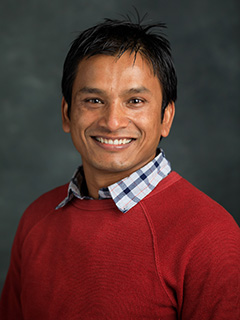
Bikash Bogati comes to the University of Tennessee, Knoxville, from a bucolic village in Nepal. He was raised by a father who left his formal education before high school because he could not afford the tuition and a mother who did not receive any formal education. Bikash enrolled in a certificate-level laboratory medicine program that would help him get a job and support his family. During his training and subsequent career as a laboratory technician at Dhulikhel Hospital, he was fascinated by the dynamics of health and diseases. After seeing humankind suffer and die from easily preventable and treatable infections, Bikash became interested in decoding the arcane language of microbial pathogens and pursued an undergraduate degree in medical microbiology. His efforts to combat infectious diseases ranged from placing an intravenous catheter in order to save the life of a patient infected with cholera in rural Nepal to dissecting a bacterial genome to understand its survival mechanisms. Working towards a doctoral degree at UT, Bikash worked with Elizabeth Fozo, associate professor in the Department of Microbiology, investigating genes that can be targeted to limit the growth of E. coli, preventing associated food-borne outbreaks.
The move to Knoxville brought Bikash thousands of miles away from his well-established social network and support system. To connect to his new community, he began volunteering to transport senior citizens and people with disabilities to medical appointments, religious services, and various errands. He believes that no matter where we are, there are always opportunities to serve the community and that is where true happiness comes from. The decision to help others enabled him to cope with the challenges of graduate school and gave him a sense of belonging. His reflections on his volunteer work were published in Science magazine.
During his graduate school career, Bikash has learned to play tennis, has enjoyed baking and brewing, and has found inspiration in hiking and camping in the Great Smoky Mountains. Now that he has received his PhD in microbiology, he will continue fighting against infectious disease by working as a post-doctoral researcher at Emory University, studying antibiotic resistance.
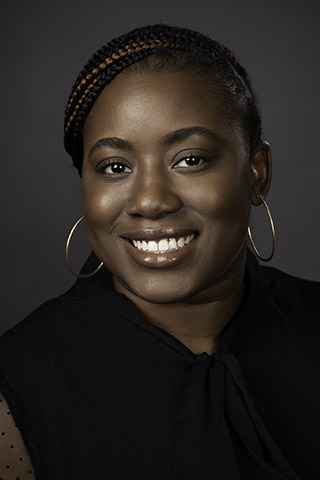
Sa’Nealdra Wiggins, the featured speaker for spring 2021, is from Clarksville, Tennessee. She moved to the city of Knoxville in 2013 in pursuit of a graduate degree from UT, after receiving a BS in health education with a concentration in public health from Middle Tennessee State University. Throughout her graduate career, Wiggins has developed a passion for women’s health and for creating equitable health-related opportunities for those in the Black community. As of spring 2021, she has solidified her graduate career by completing and obtaining a PhD in nutritional sciences with a concentration in community nutrition. She conducted her dissertation research adapting and implementing an online health promotion program for Black women. This program aimed to improve nutrition and physical activity-related-knowledge among women while testing the feasibility of an online curriculum being implemented because in-person meetings were not advisable. Sa’Nealdra is currently working on publishing the findings from this research which indicated positive outcomes related to knowledge and self-efficacy, along with the need for more diversity in the nutrition field.
Sa’Nealdra is currently a Tennessee Doctoral Fellow and a trainee in the Maternal and Child Health Nutrition Training program. She is also certified as a Health Education Specialist (CHES) and will sit for the examination to be a registered dietitian following graduation. With all that she has learned during her studies, Sa’Nealdra aspires to not only use her nutrition and public health training to make positive impacts in the Black community, but to inspire others from underserved populations to pursue careers in the health field. Her career goal aspiration is to work in the federal government sector and influence nutrition policy.
Graduate Student Speaker—Fall 2020
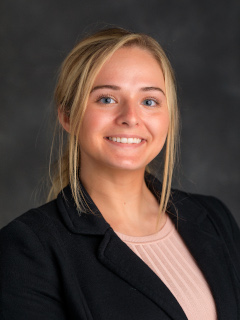
Erica Grant, a graduate student in the Bredesen Center for Interdisciplinary Research and Graduate Education, is receiving a PhD in energy science and engineering in fall 2020. She chose the PhD program offered through the Bredesen Center in part because of its entrepreneurial track, which fit well with her long-term career goals of running her own business.
Grant grew up in an entrepreneurial household in Richmond, Virginia. When she was in high school her father, Timothy, started Blue Triangle Technologies to monitor the effectiveness of commerce websites, and she helped him at trade shows. Her mom, Beverly, is a nurse educator at an assisted living facility. A fortuitous senior-year class in physics in Atlee High School in Mechanicsville, Virginia, led Grant to pursue undergraduate research in physics at Virginia Tech.
It was during her time at Virginia Tech that a couple of experiences helped to bring her to where she is now. She volunteered with the safety-awareness nonprofit Help Save the Next Girl. Her interest in security piqued, she watched seminars from a DEF CON hacker convention in Las Vegas and saw demonstrations of just how insecure smart locks can be. She also had an internship at Oak Ridge National Laboratory, where she met Travis Humble, director of ORNL’s Quantum Computing Institute at a job fair.
The result is Quantum Lock, Grant’s innovative security system for hotels and manufacturing facilities, which uses quantum computing to develop a lock keyed to batches of random numbers from a central hub. This unique development has earned her many awards, including the Crowd Favorite prize at Knoxville’s Innov865 Startup Day, the 2018 Boyd Venture Challenge, the 2019 Vol Court Pitch Contest, and Launch Tennessee’s 36/86 Business Plan Competition. While running this new business, Grant not only patented Quantum Lock on October 6, but successfully defended her dissertation on quantum information technologies and quantum computation two weeks later.
Professional Student Speaker—Fall 2020

John Brown was born and raised in Las Vegas, Nevada. He was home-schooled from the age of eight. He graduated summa cum laude with a BA in History after three and half years. While in college, he became active in the NRA-ILA referendums and fund raising. Before attending law school, he travelled extensively throughout Asia. John also worked on restoring old homes. From an early age, John has had a deep appreciation for the environment, preserving and returning nature to its pristine state. He is passionate about cleaning the oceans and keeping non-degradable plastics from entering our bodies of water, poisoning our water systems, and harming the fauna and flora.
In law school, John became the Head Ambassador for Lexis Nexus. He collaborated with the research and development department of Lexis Nexus in developing Lexis Advance into Lexis Plus and its updates. John was also one of four presenters at a Tennessee State Bar Continuing Legal Education Seminar on “COVID-19 and Its Effects on Domestic and International Human Rights.”
John finished law school in two and a half years to pursue a Master of Laws (LLM) Degree in Taxation. He plans to use his expertise in taxation to counsel farmers and business owners in Tennessee.
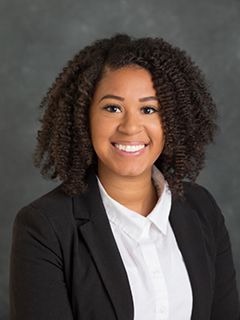
Camera Foster is receiving her PhD in materials science and engineering in fall 2019. For the past four years she has worked as a graduate research assistant with a research focus on the synthesis and characterization of single crystal scintillators for applications in medical imaging.
Camera has had a long and successful academic career at the University of Tennessee, Knoxville. She received a BS in materials science and engineering with a concentration in biomaterials in 2015. Upon graduating, she chose to continue her education in the Department of Materials Science and Engineering as a doctoral student. Accepting a position in the Scintillation Materials Research Center, she worked closely with industry representatives at Siemens Molecular Imaging to develop novel materials for radiation detection applications. In recognition of her outstanding research and academic accomplishments, Camera became a Tennessee Doctoral Scholar in 2016. This fellowship, funded by Tennessee Higher Education Commission, provided financial support for Camera complete her degree.
As a Tennessee Doctoral Scholar, Camera traveled to many conferences across the United States to present her research, receiving multiple travel awards from the Graduate Student Senate and the Department of Materials Science and Engineering. In 2018, she received an award from the southeastern chapter of the American Association for Crystal Growth for her presentation on “The Effects of Lithium Codoping on Garnet Single Crystal Scintillators.” She has published eight journal articles, four of which she is listed as first author, and has even filed a US patent application through the UT Research Foundation. In April 2019, she received the Department of Materials Science and Engineering Graduate Student Award for Excellence in Service because her passions do not end in the laboratory.
As a Knoxville native, being a “VOL” in every sense of the word comes naturally to Camera. During her graduate career, she volunteered as an executive member of the local Materials Research Society chapter and worked to promote professional development, encourage outreach among students in materials science and engineering, and recruit the next graduate class for the Department of Materials Science and Engineering. She also mentored many undergraduate researchers on projects in the laboratory and worked as a high school mentor at the Oak Ridge Chapter of ASM International’s Annual Materials Camp for multiple years. Camera’s efforts would mean nothing without the support of her family, friends, and her advisor Prof. Charles Melcher, for whom she is very grateful.
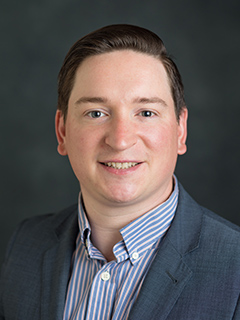
Originally from Scotland, Jamie Alexander Greig is receiving his PhD in communication and information, focusing on electric cooperatives as a solution to broadband access in rural areas, having already received an MS in communication and information from UT. Prior to this, he received a BA with first class honors in journalism from the Robert Gordon University in Aberdeen, Scotland.
As a graduate student, Jamie has been a research associate, compiling a “Treatise on Communication Law and Practice” with Professor Stuart N. Brotman, and a teaching associate where he served as primary instructor for five courses in the School of Journalism & Electronic Media. Jamie was awarded a grant by the Office of Information Technology to re-design a multimedia storytelling course for online delivery and has been the recipient of the Edward J. Meeman Fellowship in International Communication (2014, 2016 & 2017) and the Karl A. & Madira Bickel Scholarship. In 2017, he was a finalist in UT’s 3MT competition and was awarded an Institute for Information Policy Honorarium for his research on broadband access. His research on broadband access and communication policy has been published in the Journal of Information Policy and the Atlantic Journal of Communication.
Jamie has served as both senate chair and vice president of the Graduate Student Senate. Outside of UT, he is currently the communications director for the Broadcast Education Association’s Law and Policy Division. He has also frequently volunteered with the SEAD (Sustainable Equitable Agricultural Development) task force, an initiative of the Community Economic Development Network of East Tennessee. This task force works to develop and establish sustainable, practical, and long term, land-based economic projects with rural East Tennessee organizations and is currently focused on bringing high-speed fiber optic broadband to rural communities in Tennessee. Jamie’s work with SEAD resulted in a $400,000 national first place award from the Mozilla Foundation and NSF to identify community-based solutions to rural broadband connectivity.
After graduating, Jamie will project manage a community broadband project in Tennessee and will connect this work to UT through a research fellowship at the Baker Center for Public Policy. Jamie lives in Fountain City with his wife Kaylen Mallard who is the Chief Development Officer for Remote Area Medical (RAM).
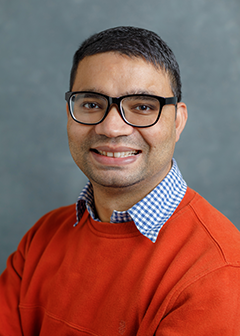
Suresh Poudel was born in a rural region of Nepal’s Kaski District, where he spent his childhood and teens under extreme poverty. Despite the lack of money and numerous deprivations, he persevered, making his way to college. While earning his undergraduate degree at Kathmandu University, Poudel received the Vice Chancellor Gold Medal and National Gold Medal for securing the highest cumulative grade-point average in the entire university and its affiliated colleges. He started his first job as a teacher in the Department of Biotechnology at Kathmandu University. His teaching experiences in courses such as Biochemistry and Enzymology laid a strong foundation for success in his future master’s and doctoral research.
After two years of teaching, Poudel received the prestigious QUOTA scholarship to pursue an MSc at the Norwegian University of Science and Technology. After receiving his MSc, he returned to Kathmandu University to work as a lecturer in the Department of Biotechnology; two years later, he was accepted into the Genome Science and Technology program at the University of Tennessee, Knoxville. While pursuing his PhD, he worked in Robert L. Hettich’s lab at Oak Ridge National Laboratory (ORNL). Poudel’s research is focused on describing microbial proteins using mass spectrometry techniques and computational tools in order to understand the metabolism within the microbe. While in his graduate program at UT, Suresh attained two first-author publications in the journal Biotechnology for Biofuels, along with multiple papers on which he was a co-author. He served as the president of the University of Tennessee Nepali Students Association (UTNSA) from 2016–2017 and is actively involved in advisory activities for the association.
Poudel is currently a researcher in the Biosciences Division at ORNL, focused on establishing a platform for comprehensively studying lipids in a system. Besides being passionate about life sciences, he plays several sports including soccer, cricket, volleyball, and badminton. Throughout his academic career, he has kept a focus on his home country of Nepal, not only through his work with the UTNSA, but also by participating in Nepali cultural dances in Nepal, Norway and the USA. Suresh has been happily married for seven years and his wife, Pragya, is pursuing a doctoral degree in public health at UT.
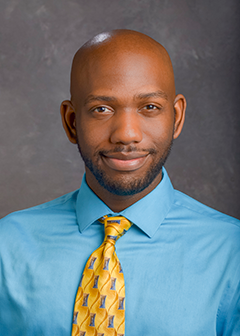
Vincent Price is receiving his PhD in Teacher Education, with a focus on the teaching of Black literature, having already received an MS in Teacher Education from UT. He comes to us from the University of Southern Mississippi, where he earned his BA in English, with a minor in French. He is looking forward to taking what he has learned here at Rocky Top to high schools in Beaumont, Texas.
He knew early on that he was going to go to graduate school but took time after receiving his undergraduate degree to teach at the high school level in his hometown of Vicksburg, Mississippi. During the four and a half years he spent teaching in grades 9-12, he strove to bring Black literature into the classroom whenever possible. This passion for increasing the amount of Black literature taught in schools has clearly been a major theme throughout his Master’s and PhD research programs.
While in his graduate program at UT, Vincent published a paper in the journal Changing English, entitled “Flipping the coin: Towards a double-faced approach to teaching Black literature in secondary English classrooms.” He has also presented at events such as the New Directions in Critical Race and Ethnic Studies Conference and at the Literacy Research Association’s 66th Annual Conference as part of the Critical Race Theory Study Group. He served as the Public Relations Officer for the Multicultural Graduate Student Organization from 2014–2016, and remains an active member.
By his own admission, Vincent enjoys “expanding his comfort zone.” He earned first place in the 2017 3MT competition at UT and went on to receive the People’s Choice Award at the regional competition. He began taking ballroom dance classes during his Master’s program, and has expanded his repertoire during his PhD program, taking tango, salsa, bachata, and now tap dancing. Adding Spanish language, piano, and skating to his list of new endeavors, Vincent finds many ways to balance his work with a discovery of what else life has to challenge him.
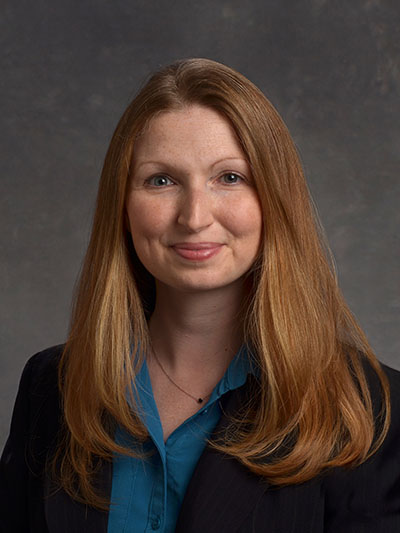
Kerri Ann Considine is currently a Postdoctoral Lecturer in the Department of English here at the University of Tennessee, Knoxville. Her research focuses on dramatic literature, theatre, and performance studies, with a specific concentration on the relationship between technology and the live body in performance.
Considine’s academic and professional career began in the theatre and has continued to unfold through it. She received a BFA in theatre arts (summa cum laude) from the Conservatory of Performing Arts at Point Park University in Pittsburgh, which led to an internship in the Artistic Department at Steppenwolf Theatre in Chicago. Before returning to academia, Considine spent time working in non-profit and arts administration, running special events and raising money for the Lyric Opera of Chicago and Friends of Great Smoky Mountains National Park.
Considine has received both her PhD and Master of Arts degrees in English from UT, and was honored to hold a Graduate Fellowship in the University of Tennessee Humanities Center for the 2016–2017 academic year. In addition to teaching in both the UT English and Theatre departments, she has worked with the Clarence Brown Theatre as dramaturg and assisted with the research and development of several productions, including Top Girls and The Crucible from the 2016–2017 season. Last spring, she co-organized a public event, “Top Girls and Busy Bodies: Spotlight on Women’s Issues,” sponsored by UT’s Commission for Women and the Department of Theatre in conjunction with the spring productions of Susanna Centlivre’s The Busy Body and Caryl Churchill’s Top Girls. During her time at UT, Considine served as a research assistant for two major anthologies: The Norton Anthology of Drama, Second Edition, and The Routledge Anthology of Restoration and Eighteenth-Century Drama. Her performance review of the US premiere of Caryl Churchill’s Escaped Alone was published on ASAP/Journal’s online platform in June 2017, and her review of the Broadway production of Hand to God by Robert Askins appeared in Theatre Journal in March 2016.
A native of Louisville, Kentucky, Considine is grateful to her family for their love and support, especially to her husband, Sean. She would also like to thank the faculty and staff of the Departments of English and Theatre for their generosity and support.
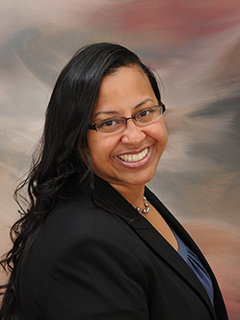
Michelle Harding came to UT after earning her bachelor’s and master’s degrees at the University of Virginia and after gaining 10 years of industry experience. She will graduate in spring 2017 with a PhD in business administration with an accounting emphasis. She has already accepted a tenure track position as an assistant professor of accounting at Virginia Tech, starting in fall 2017.
Harding’s interests in tax disclosure and policy steered her to a dissertation entitled “The Impact of Increased Tax Return Reporting on Financial Statement Tax Disclosure Quality: Evidence from IRS Schedule UTP.” When she graduates, she will be the first African-American female to receive a PhD in accounting from UT. Being the only African-American PhD student in Haslam motivated Harding to help found UT’s Multicultural Graduate Student Organization (MGSO). The MGSO was created to help build community among UT’s diverse graduate student population and provide professional development opportunities that expose students to the wealth of resources available on campus. Harding feels that this has been her most important accomplishment at UT outside of successfully completing the doctoral program.
Harding credits many people in the Haslam College of Business as playing a critical role in her success. She lauds the influence and guidance of her dissertation chair LeAnn Luna, recognizes Robert Fuller for his role in encouraging her research pursuits, and speaks very highly of Linda Myers for providing an environment that gives PhD students equal access, rewards their effort, and celebrates their success. And she is optimistic about the direction of the college and supports its investment in authentic diversity, especially through the efforts of college administrators such as Tyvi Small and Dean Stephen Mangum.
A native of Williamsburg, Virginia, Michelle’s accomplishments extend beyond the classroom and beyond UT. She has traveled to four continents, and three of these visits were for short-term mission trips. She volunteers as a mentor in Knoxville and previously showed her volunteer spirit in Orlando and Nashville. She currently serves on the board of Girl Talk, Inc., where she has volunteered as an after-school mentor to girls in third through fifth grades at Green Magnet Elementary School.